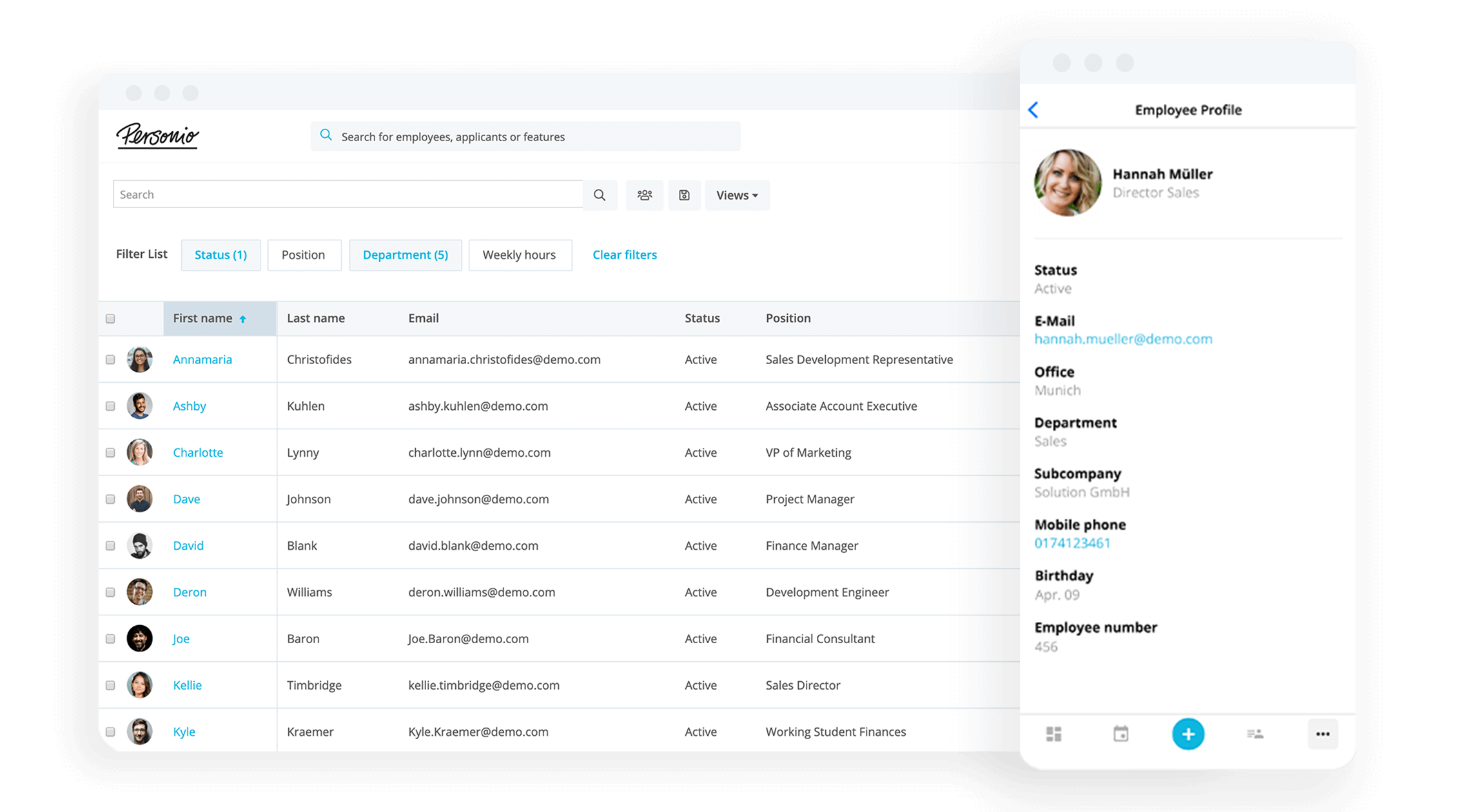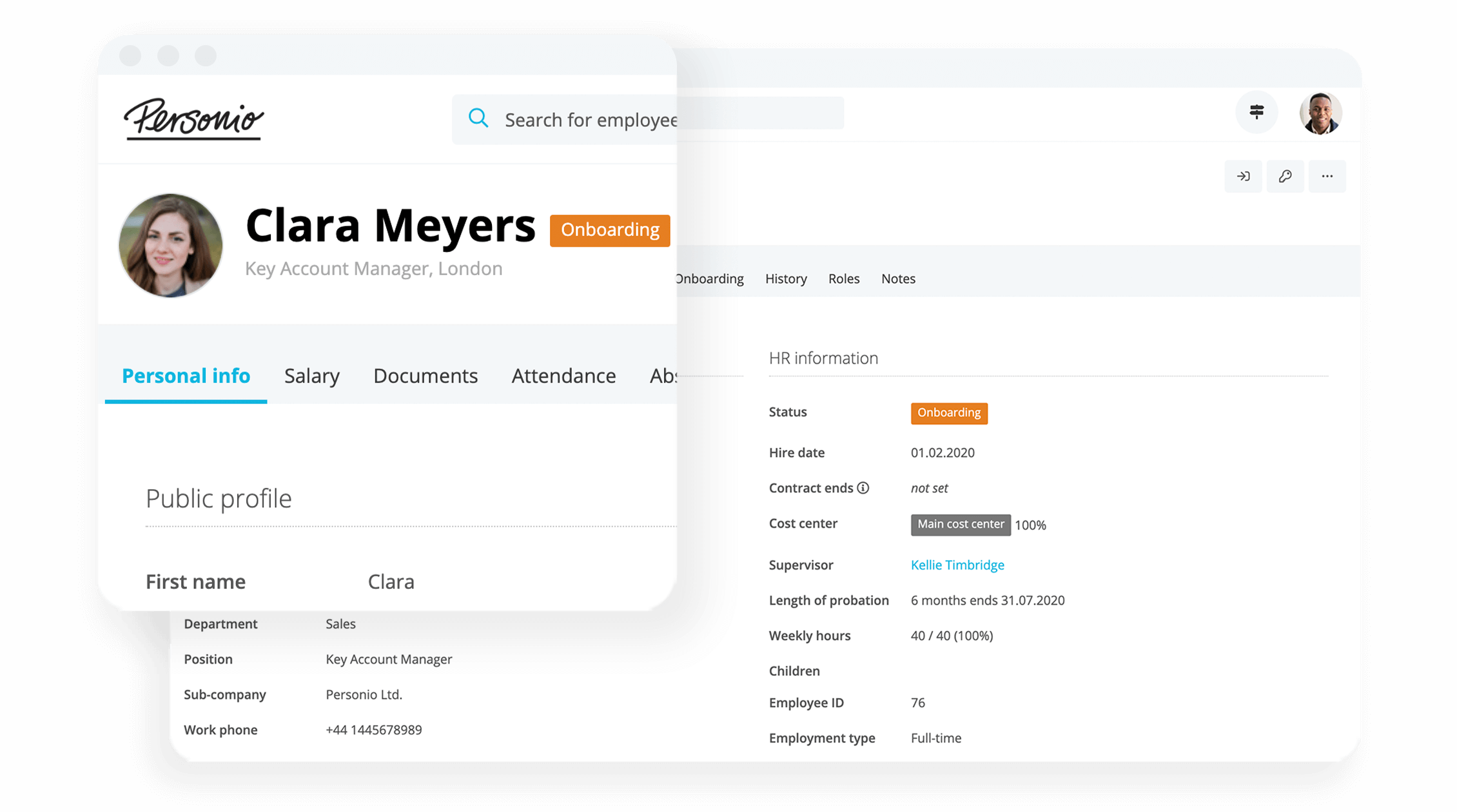An all-in-one HRIS can completely change the makeup of your organisation’s people function. In this article, we offer a glimpse into the world of HRIS systems, the features that define them and concrete examples of human resource information systems in action. Let’s outline the case for implementing a better way to manage HR in your organisation today.
Speak to a Personio expert today to help tackle your most pressing HR challenges.
Contents
What is HRIS?
Why Do You Need an HRIS?
5 Questions To Help Choose Your Ideal HRIS
The Must-Have Features for Any HRIS Software?
When Is the Right Time for an HRIS?
Finding An HRIS Designed To Help
What is HRIS?
An HRIS (Human Resource Information System) is software designed to facilitate your everyday HR work. That can include storing, editing, managing, tracking and reporting on all things employee-related in your organisation. Think of it as a single source of truth for managing your entire HR function, where information can be housed, changes can be tracked and reports can be generated in a flash.
What Does An HRIS Do?
Most HRIS come with certain core HR-related competencies. This typically includes some high-level functionality, such as:
- Digital employee files and record-keeping
- Employee self-service (making changes individually)
- Managing absences and attendance
- Keep a record of employee training
- HR analytics and generating reports
Simply put, an HRIS is designed to make it easier for your team (and organisation) to manage your processes and data.
Why Do You Need an HRIS?
The benefits of an HRIS are incredibly diverse, almost as diverse as your options. You should consider investing in one if you want to take advantage of any of these five key advantages:
- Saving Time – If you have access to a great HRIS, your HR team spends less time entering information manually, struggling to generate reports, capturing signatures from people quickly and easily and saving time to focus on more strategic initiatives. For instance, Personio saves HR teams up to 60 hours per month.
- Streamlining Information – Ever feel like your HR work goes unnoticed or underrepresented? An HRIS can help keep teams organised by operating from one single source of truth. One set of information, easily accessible by all, to eliminate confusion and increase transparency.
- Keeping Compliant – The right HRIS will be 100% compliant with European data standards (GDPR). After all, people in your organisation need to trust that their data is in safe hands — and HRIS software, when designed well and with the appropriate amount of diligence, can ensure this is the case.
- Creating Great Candidate Experiences – When an HRIS has a strong recruitment function, it can ensure that new employees have a great recruiting experience and a great onboarding. Your processes, productivity and culture all benefit, which, if you ask us, is reason enough to implement an HRIS right this second.
- Making Data-Based Decisions – A great HRIS should be able to generate reports that educate your HR team, as well as your entire organisation. Easily-generated reports, created at the click of a button, can make this a reality.
5 Questions To Help Choose Your Ideal HRIS
Every HRIS is different, which is why you need to choose the right one for your organisation’s needs. Let’s start by framing your solution of choice through five key questions. We’ll then break each of them down, one by one:
1. How Big Is Your Organisation and Team?
The right HRIS is designed to do two things: Manage the needs of your current workforce while being able to project ahead and handle the needs of your teams years from now. You effectively need a solution that can future-proof your HR function.
This is especially true when it comes to the strategic role of scaling HR teams. If you want the time to focus on topics like salary benchmarking, diversity and inclusion or even more core processes like onboarding or performance, you need a solution that doesn’t need babysitting every time you add new employees.
So, how big is your team? At Personio, we focus on the needs of European SMEs who are trying to streamline and standardise their HR processes for peak performance. For us, we offer a customisable solution designed to meet the needs of small or medium-sized teams.
2. Are You Trying To Scale Your Teams and Business?
Whether large or small, every organisation needs top talent. Therefore, recruitment is an essential part of any HRIS. This is not only true for sourcing great talent, but for ensuring a top candidate experience and recruiting journey.
If you are trying to grow your team, or meet your lofty hiring goals (whether quantitatively or qualitatively), you need an HRIS that can manage candidates, automate your responses (like confirmation emails for resumes) and store feedback from interview rounds and potential supervisors.
The greatest competitive advantage: An HRIS that can turn a candidate into an employee with one click. Within Personio, we try to make it easy by allowing candidates to sign contracts electronically while turning them into employees in a flash.
3. How Important Is Development in Your Organisation?
What kind of weight does your organisation put on performance and development? A great HRIS not only focuses on storing data but on taking things to the next level when it comes to getting the absolute most out of your top talent.
In addition, it means your organisation doesn’t have to worry about purchasing, implementing and managing a solution for data and a solution for performance. Instead, you can have everything at once.
Performance with Personio looks like this: Automating your performance cycles, automatically reminding managers about performance talks and keeping feedback and goals in one place.
That way, your managers can focus on the quality of conversations rather than simply trying to make sure they happen at all.
4. Which HR Processes Do You Want To Master?
As an HR function, there’s likely a whole host of processes that you want to focus on. So, you need a solution that can help you get started, optimise and master whatever you want to accomplish for your people.
That could be recruiting, onboarding, performance, payroll or anything in between. An all-in-one solution can ensure that you are able to tackle everything that you want while giving you the time back to approach each of these issues strategically.
Give Your HR Processes A Big Boost
By implementing an all-in-one HRIS that can store, manage and optimise your employee data. Discover Personio today.
5. What’s Your Budget?
Because it all comes down to the bottom line.
How much does it take to invest in an HRIS? Speaking from our own experience at Personio, our HRIS is positioned around three types of plans: essential, professional and enterprise. The idea is to provide something that works for just about any organisation and billed on the number of employees that you need to be managed, per month.
But, to really answer this question, we’d suggest visiting our pricing page and using our cost calculator to find out more.
The Must-Have Features for Any HRIS Software
A strong HRIS software solution should include a certain level of basic functionality:
| HRIS Must-Have | Why? |
|---|---|
| Document Storage | To keep all your company documents and policies in one place. |
| Templates | To streamline offer letters, travel policies, and more. |
| Self-Service | To ensure data is up-to-date -- employees make changes and HR approves them. |
| ATS | To source, interview, provide feedback on, and hire the best candidates. |
| Performance Functionality | To schedule performance cycles, house feedback, and create goals. |
Recruit, manage, develop, and report on your employees in one tool: Personio.
When Is the Right Time for an HRIS?
At what point should you invest in HRIS software? Here are some of the most common warning signs:
| Warning Sign | The Consequence |
|---|---|
| You're struggling with HR paperwork. | You spend more time on admin and not on your people. |
| You can't see the bigger picture of your people. | You might miss out on an essential element of people strategy: people. |
| Reports take forever to collect and create. | Less reliable data, slower reporting times, less confidence from management. |
| Onboarding processes aren't set. | New employees struggle to catch up and performance dwindles. |
| Your performance review process is done manually. | Your employees will feel frustrated, processes will lag, and engagement will suffer. |
| You manage absences over email. | Data gets lost, projects get dropped, business suffers. |
| Employee data is spread out across spreadsheets. | Not only not organized, but a major security risk and a lack of compliance. |
If there’s anything related to HR documentation that you could plan, store, save, access or retrieve in a digital way, you should start looking into an HRIS.
Finding An HRIS Designed To Help
The problem with choosing an HRIS is that there are so many options, it can be unfortunately easy to get it wrong. You need a solution that meets the needs of your organisation yesterday, today and tomorrow, and not simply something that sounds good now but won’t grow with you.
At Personio, we have created an all-in-one HRIS designed to store employee data securely, manage all your HR processes and even go above and beyond to help redefine the future of how HR work is done.
Want to join us on the journey? Speak to one of our product experts about our HRIS solution and implementing Personio in your organisation — for the benefit of your HR team — today.
See Personio’s
HRIS In Action






